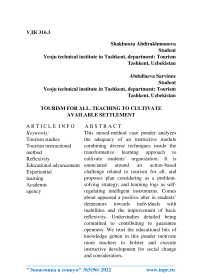Tourism for all. Teaching to cultivate available settlement
Автор: Abdirakhmonova Sh., Abdullaeva S.
Журнал: Экономика и социум @ekonomika-socium
Рубрика: Современные науки и образование
Статья в выпуске: 5-1 (96), 2022 года.
Бесплатный доступ
This mixed-method case ponder analyzes the adequacy of an instructive module combining diverse techniques inside the transformative learning approach to cultivate students’ organization. It is enunciated around an action-based challenge related to tourism for all, and proposes plan considering as a problem-solving strategy, and learning logs as self-regulating intelligent instruments. Comes about appeared a positive alter in students’ demeanors towards individuals with inabilities and the improvement of basic reflexivity. Understudies detailed being committed to contributing to guarantee openness. We trust the educational bits of knowledge gotten in this ponder motivate more teachers to bolster and execute instructive development for social change and consideration.
Tourism studies, tourism instructional method, reflexivity, educational advancement, experiential learning, academic agency
Короткий адрес: https://sciup.org/140292977
IDR: 140292977 | УДК: 316
Список литературы Tourism for all. Teaching to cultivate available settlement
- Airey, D., Dredge, D., & Gross, M. J. (2015). Tourism, hospitality and events education in an age of change. In D. Airey, D. Dredge, & M. J. Gross (Eds.), The routledge handbook of tourism and hospitality education (pp. 3–14). Routledge.
- Alsina, A., ´ Ayllon, ´ S., Colomer, J., Fern´ andez-Pena, ˜ R., Fullana, J., Pallisera, M., et al. (2017). Improving and evaluating reflective narratives: A rubric for higher education students. Teaching and Teacher Education, 63, 148–158. https://doi.org/10.1016/j.tate.2016.12.015
- Altinay, L., & Paraskevas, A. (2008). Planning Research in hospitality & tourism (First). Elsevier. https://doi.org/10.1016/B978-0-7506-8110-0.50010-7
- Belhassen, Y., & Caton, K. (2011). On the need for critical pedagogy in tourism education. Tourism Management, 32, 1389–1396.
- Bhushan, S. (2019). Design thinking in hospitality education and research. Worldwide Hospitality and Tourism Themes, 11(4), 449–457. https://doi.org/10.1108/WHATT-04-2019-0022
- Bizjak, B., Kneˇzevi´c, M., & Cvetreˇznik, S. (2011). Attitude change towards guests with disabilities. Reflections from Tourism Students. Annals of Tourism Research, 38 (3), 842–857. https://doi.org/10.1016/j.annals.2010.11.017
- Boluk, K. A., & Carnicelli, S. (2015). Activism and critical reflection through experiential learning. Journal of Teaching in Travel & Tourism, 15(3), 242–251. https://doi.org/10.1080/15313220.2015.1059304
- Boluk, K. A., Muldoon, M. L., & Johnson, C. W. (2019). Bringing a politics of hope to the tourism classroom: Exploring an integrated curriculum design through a creative and reflexive methodology. Journal of Teaching in Travel & Tourism, 19(1), 63–78. https://doi.org/10.1080/15313220.2018.1560532
- Boyle, A., Wilson, E., & Dimmock, K. (2015). Space for sustainability? Sustainable education in the tourism curriculum space. In D. Dredge, D. Airey, & M. J. Gross (Eds.), The routledge handbook of tourism and hospitality education (pp. 519–531). Routledge.
- Braun, V., & Clarke, V. (2006). Using thematic analysis in psychology. Qualitative Research in Psychology, 3(2), 77–101. https://doi.org/10.1191/1478088706qp063oa
- Brown, T. (2009). Change by design: How design thinking transforms organizations and inspires innovation. Harper Collins.
- Castello, ´ M., Banales, ˜ G., & Vega, N. A. (2010). Research approaches to the regulation of academic writing: The state of the question. Electronic Journal of Research in Educational Psychology, 8(22), 1253–1282.
- Invisible Scholars, 143–174. https://doi.org/10.1016/B978-0-12-813169-5.00007-0
- Caton, K. (2012). Underdisciplinarity: Where are the humanities in tourism education? In C. Schott, & M. Fesenmaier (Eds.), Tourism education futures institute 6th annual conference. TEFI.


